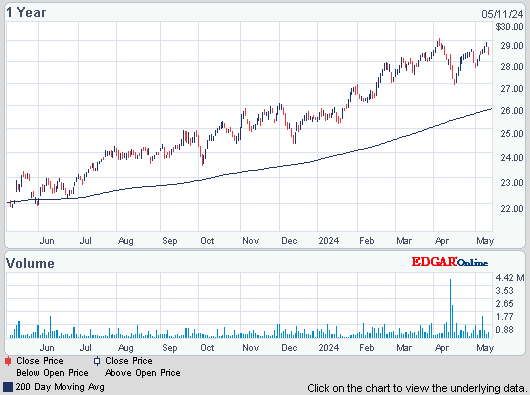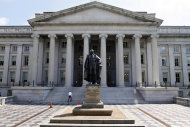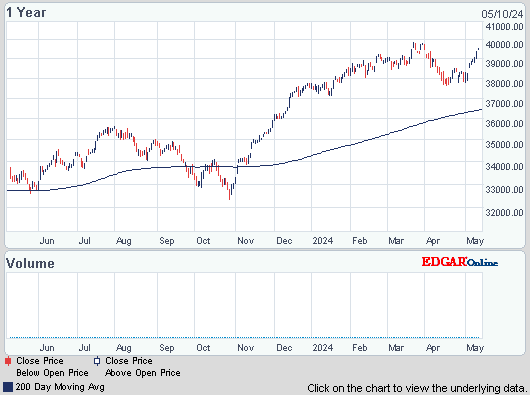Dow sank 127, decliners ahead of advancers almost 4-1 & NAZ lost 36. The MLP index was up pennies in the 443s (down 25 from the recent record high) & the REIT index dropped another 4+ to 274 (down 41 from its highs last month). Junk bond funds sold off again, down 2-3%, & Treasuries declined, bringing higher yields. Oil fell along with stocks while there were buyers for gold.
AMJ (Alerian MLP Index tracking fund)

![Live 24 hours gold chart [Kitco Inc.]](http://www.kitco.com/images/live/gold.gif)


Photo: Yahoo
The US budget deficit widened in May by $139B, but the annual deficit stayed on track to finish below $1T for the first time since 2008. Economic growth & higher tax rates have boosted tax revenue while gov spending has barely increased. With the May increase, the deficit through the first 8 months of this budget year totaled $626B, according to the Treasury. That's $218B lower than the same period last year. The Congressional Budget Office estimates the deficit won't grow much before the budget year ends on Sep 30. It forecasts an annual deficit of $642B, well below last year's deficit of $1.09T & the lowest in 5 years. However it would still be the 5th-largest deficit in history. Each deficit contributes to the national debt, which recently topped $16T. At the same time, a smaller deficit has taken pressure off of negotiations to raise the federal borrowing limit.
So far this budget year, revenue has risen 15% to $1.8T because of higher rates that went into effect on Jan 1. Modest economic growth has also boosted tax revenue. Additionally, this month the gov is expecting large divs from Fannie Mae & Freddie Mac, which will keep the deficit from growing. Fannie is expected to pay $59B & $7B from Freddie. The mortgage giants are profitable again & are paying divs in return for the loans they received during the financial crisis. While revenue has increased greatly, spending has only risen 0.8% this year to $2.4T. Military spending has dropped 4.3%, reflecting the winding down of the wars in Iraq & Afghanistan. Spending on unemployment benefits fell 25% compared with the same period a year ago.
Budget Deficit in U.S. Widened in May as Spending Increases 10%
Consumer prices climbed 1.1% in the 12 months thru Apr, according to a measure that excludes food & fuel watched by the Federal Reserve (FED), matching the smallest increase since records began in 1960. That’s down from 1.9% in the year ended Apr 2012. Among the reasons for slowing inflation are improved efficiency & a stronger dollar, which puts downward pressure on prices of imported goods such as cars & clothing. FED officials next week will weigh how much changes in inflation & the labor market will influence the pace of their $85B monthly asset purchases. James Bullard, president of the St. Louis Fed, this week said inflation below the central bank’s 2% target may warrant prolonging bond buying. Yields on Treasuries & mortgage rates have surged recently as gains in employment prompt speculation the FED will soon reduce asset purchases. At the same time, declining inflation gives it room to maintain record economic stimulus as policy makers seek to lower a jobless rate of 7.6%.
Inflation at 53-Year Low Belies U.S. Demand Strength: Economy

Photo: Bloomberg
Germany’s top judges examining the ECB's plan to buy bonds of crisis-torn countries asked whether the operation crosses the line from legitimate monetary policy to illicit state financing. Witnesses at the 2nd day of hearings before the Federal Constitutional Court in Karlsruhe faced queries from the panel on whether the central bank’s Outright Monetary Transactions program oversteps the mark beyond the ECB’s mandate to conduct monetary policy. Judges also asked whether the rules underpinning that mandate should be revamped. Bundesbank President Jens Weidmann said today that while officials could put the OMT on a tighter leash, it would no longer be the same instrument. Asked whether the markets believed that the ECB would use “unlimited firepower,” he said the spread reduction after the OMT announcement indicate that the markets took the central bank at its word. “Of course it’s possible that the ECB uses its unlimited firepower, but the question then is if this firepower is consistent with our mandate,” said Weidmann. Germany’s top court is reviewing suits by political groups, professors & lawmakers who argue the ECB’s OMT program & the European Stability Mechanism violate European laws & the constitutional principle of democracy. Watch this case.
ECB Court Probe Focuses on Limits to Monetary Policy
Traders are nervous which has prompted recent selling. Dow fell all week, closing below 15K today. This selling tells us that markets have been rising on expectations that the Federal Reserve will continue its low interest rates (not an improving economy). If that policy is altered, selling results as has been the case for weeks. The high yield sectors are feeling that selling pressure. Junk bond funds had a very large decline today on emotional selling. A lot will be riding on the FOMC meeting, what they do & what they say.
Dow Jones Industrials

AMJ (Alerian MLP Index tracking fund)
Treasury yields:
U.S. 3-month |
0.05% | |
U.S. 2-year |
0.32% | |
U.S. 10-year |
2.22% |
| CLN13.NYM | ...Crude Oil Jul 13 | 95.83 | (0.5%) |
![Live 24 hours gold chart [Kitco Inc.]](http://www.kitco.com/images/live/gold.gif)


Photo: Yahoo
The US budget deficit widened in May by $139B, but the annual deficit stayed on track to finish below $1T for the first time since 2008. Economic growth & higher tax rates have boosted tax revenue while gov spending has barely increased. With the May increase, the deficit through the first 8 months of this budget year totaled $626B, according to the Treasury. That's $218B lower than the same period last year. The Congressional Budget Office estimates the deficit won't grow much before the budget year ends on Sep 30. It forecasts an annual deficit of $642B, well below last year's deficit of $1.09T & the lowest in 5 years. However it would still be the 5th-largest deficit in history. Each deficit contributes to the national debt, which recently topped $16T. At the same time, a smaller deficit has taken pressure off of negotiations to raise the federal borrowing limit.
So far this budget year, revenue has risen 15% to $1.8T because of higher rates that went into effect on Jan 1. Modest economic growth has also boosted tax revenue. Additionally, this month the gov is expecting large divs from Fannie Mae & Freddie Mac, which will keep the deficit from growing. Fannie is expected to pay $59B & $7B from Freddie. The mortgage giants are profitable again & are paying divs in return for the loans they received during the financial crisis. While revenue has increased greatly, spending has only risen 0.8% this year to $2.4T. Military spending has dropped 4.3%, reflecting the winding down of the wars in Iraq & Afghanistan. Spending on unemployment benefits fell 25% compared with the same period a year ago.
Budget Deficit in U.S. Widened in May as Spending Increases 10%
Consumer prices climbed 1.1% in the 12 months thru Apr, according to a measure that excludes food & fuel watched by the Federal Reserve (FED), matching the smallest increase since records began in 1960. That’s down from 1.9% in the year ended Apr 2012. Among the reasons for slowing inflation are improved efficiency & a stronger dollar, which puts downward pressure on prices of imported goods such as cars & clothing. FED officials next week will weigh how much changes in inflation & the labor market will influence the pace of their $85B monthly asset purchases. James Bullard, president of the St. Louis Fed, this week said inflation below the central bank’s 2% target may warrant prolonging bond buying. Yields on Treasuries & mortgage rates have surged recently as gains in employment prompt speculation the FED will soon reduce asset purchases. At the same time, declining inflation gives it room to maintain record economic stimulus as policy makers seek to lower a jobless rate of 7.6%.
Inflation at 53-Year Low Belies U.S. Demand Strength: Economy

Photo: Bloomberg
Germany’s top judges examining the ECB's plan to buy bonds of crisis-torn countries asked whether the operation crosses the line from legitimate monetary policy to illicit state financing. Witnesses at the 2nd day of hearings before the Federal Constitutional Court in Karlsruhe faced queries from the panel on whether the central bank’s Outright Monetary Transactions program oversteps the mark beyond the ECB’s mandate to conduct monetary policy. Judges also asked whether the rules underpinning that mandate should be revamped. Bundesbank President Jens Weidmann said today that while officials could put the OMT on a tighter leash, it would no longer be the same instrument. Asked whether the markets believed that the ECB would use “unlimited firepower,” he said the spread reduction after the OMT announcement indicate that the markets took the central bank at its word. “Of course it’s possible that the ECB uses its unlimited firepower, but the question then is if this firepower is consistent with our mandate,” said Weidmann. Germany’s top court is reviewing suits by political groups, professors & lawmakers who argue the ECB’s OMT program & the European Stability Mechanism violate European laws & the constitutional principle of democracy. Watch this case.
ECB Court Probe Focuses on Limits to Monetary Policy
Traders are nervous which has prompted recent selling. Dow fell all week, closing below 15K today. This selling tells us that markets have been rising on expectations that the Federal Reserve will continue its low interest rates (not an improving economy). If that policy is altered, selling results as has been the case for weeks. The high yield sectors are feeling that selling pressure. Junk bond funds had a very large decline today on emotional selling. A lot will be riding on the FOMC meeting, what they do & what they say.
Dow Jones Industrials











No comments:
Post a Comment